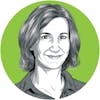 See
more of the story
See
more of the story
It was a summer of hunger at Minnesota food shelves.
"We're seeing an increase in folks using the food shelf," said Patrick Felker, manager of the Interfaith Outreach Food Shelf in Plymouth. "Folks we haven't seen since the pandemic started, and lots of new folks as well. More people are using us now than were in 2020 or 2021."
Groceries cost a lot more now than they did in 2020 or 2021.
When people come in for the first time and see some items in stock at the food shelf, they sometimes gasp in shock, Felker said. "It's like 'Oh my God, you guys have toilet paper!' Things like that are getting really expensive."
Nina, a Plymouth woman who works and is caretaker for her husband, used to be the one donating to Interfaith Outreach and those in need. Until her longtime employer moved out of state. Until her husband suffered a series of debilitating strokes.
We're just calling her Nina because it can be hard to admit you need help with groceries, even though what happened to her family could happen to any of us.
"We live in Plymouth. We have a house. You wouldn't think we would need a food shelf," Nina said.
People are hurting in the affluent west metro suburbs. But if you know Minnesotans, you know people are also helping.
"The community always seems to step up," said Deb Sakry Lande, spokeswoman for Interfaith Outreach, which helps residents of Plymouth and western Hennepin County with everything from job searches to housing assistance and fresh produce.
"We've been in the suburbs for 43 years," Lande said. "Even back in the day when people didn't believe there was poverty in the suburbs, we've been here and we know it's here."
The helpers could use some help right now. Fundraising in the final three months of the year can make or break a nonprofit's budget for the following year.
If your grocery bill takes your breath away, spare a thought for the food shelves that must stock the pantry to feed thousands. Interfaith Outreach estimates it spent 44% more on food between June and September than it did a year ago.
For two years, we were in COVID lockdown, in a recession, in neighborhoods where riots destroyed the nearest grocery store. But for two years, the nation threw a lifeline to struggling Americans — supplementing lost wages, subsidizing free school lunches, and offering expanded child tax credits that lifted millions of families out of poverty.
Then the lifeline was gone. And prices were rising.
The cost of a carton of eggs doubled. Our paychecks didn't. People living on fixed incomes, people living paycheck to paycheck, suddenly found that the grocery budget no longer covered the groceries — never mind the eyewatering prices of toothpaste or toilet paper.
Nina cut back, bought in bulk, shopped the sales, skipped the luxuries. When her grocery budget fell short, the Interfaith Outreach food shelf was there for her. A place where the human contact was as nourishing as the food.
"The kindness of the people there — you feel like there's no judgment," she said. "They're just glad to help you."
Interfaith Outreach partnered with University of Minnesota Extension to turn its food shelf into a "supershelf" — designed to have the look, feel and dignity of a visit to a supermarket, not a charity shop. The space is airy, cheerful and as well-stocked as donations allow.
At the food shelf, Felker works to make sure the food on the shelf is comfort food. Healthy foods for people with high blood pressure or diabetes. Halal meat for Muslim families.
"For a food shelf, you want to be more than just 'Hey, come get your can of beans,' " Felker said. "You want to have items that really meet families where they are."
Nina is sustained by her faith and overwhelmed by the generosity of her community, which stocked its food shelf with fresh produce and foods that accommodate her husband's allergies.
"It's easier to be on the giving end, sometimes," she said. "It can be humbling to be on the receiving end. But we have to learn how to receive as well as give."
If you can, help your neighborhood food shelf. If you're the one who needs help this time, there are food shelves in all 87 Minnesota counties and Second Harvest Heartland can help you find the helpers near you: www.2harvest.org/who—how-we-help/how-to-get-help.




